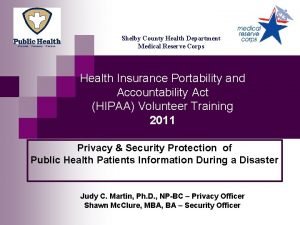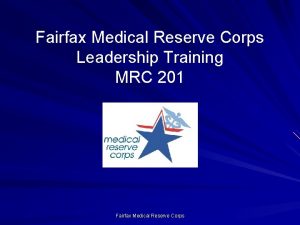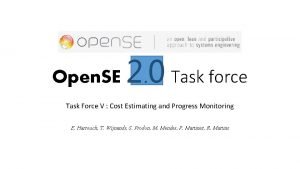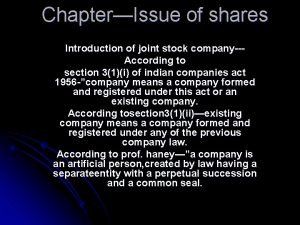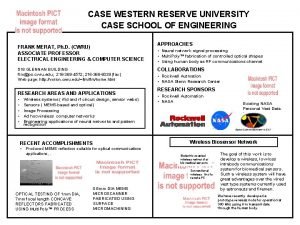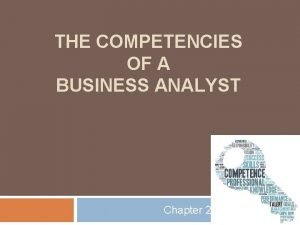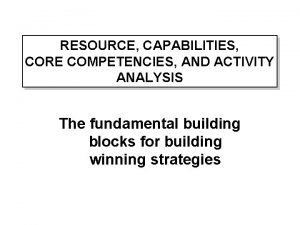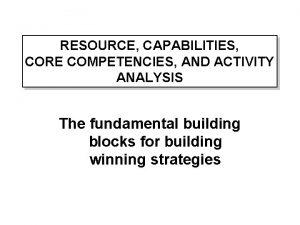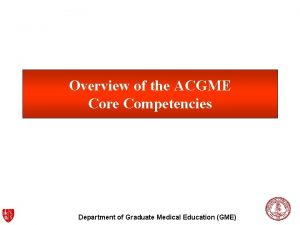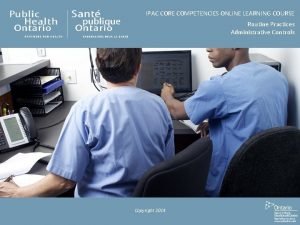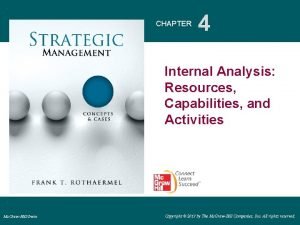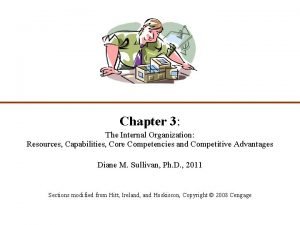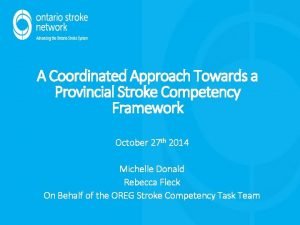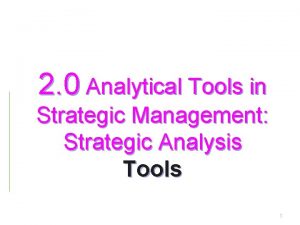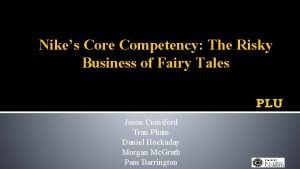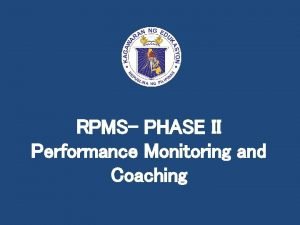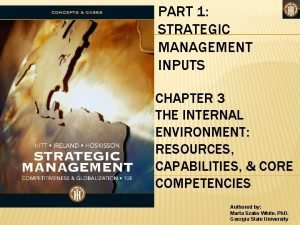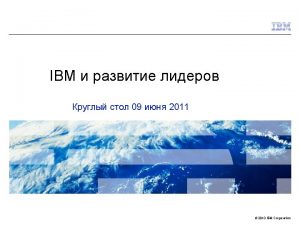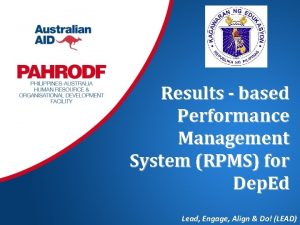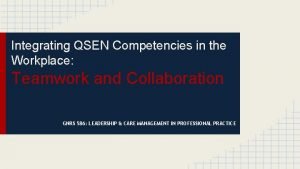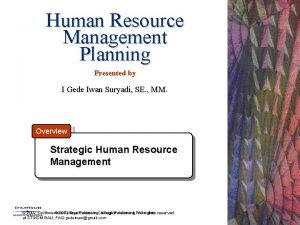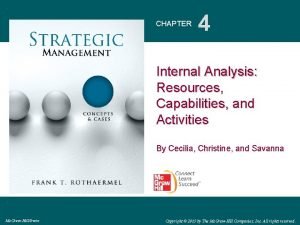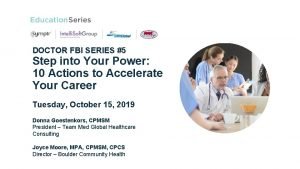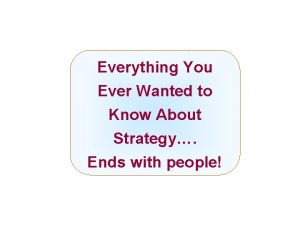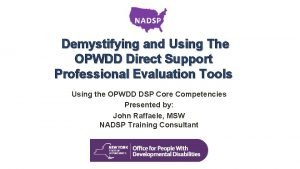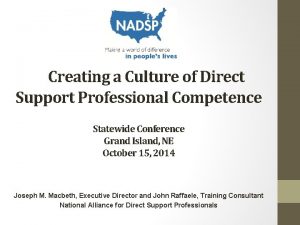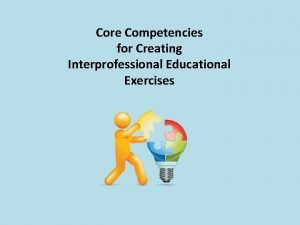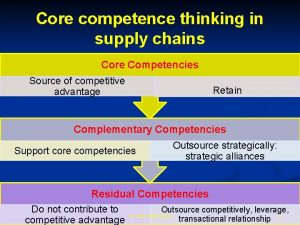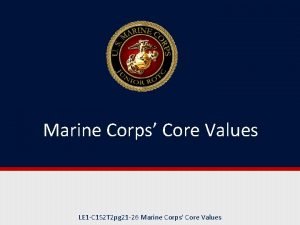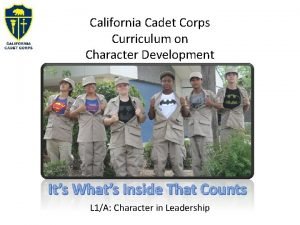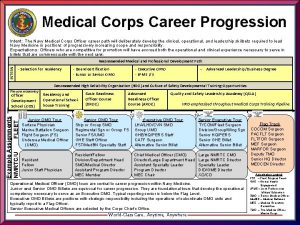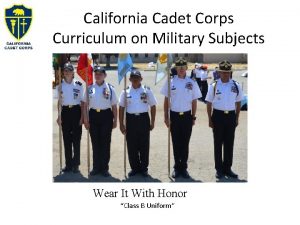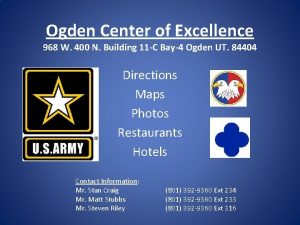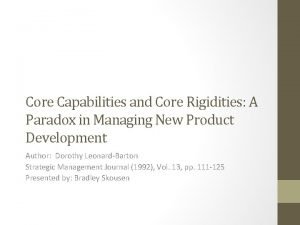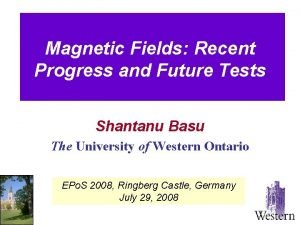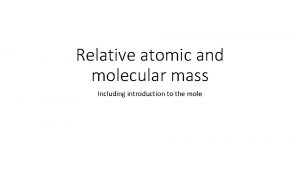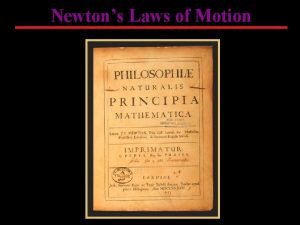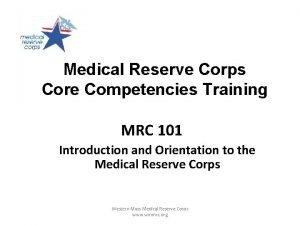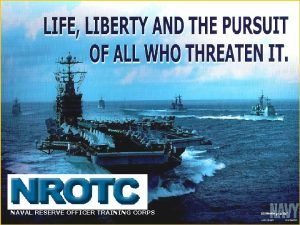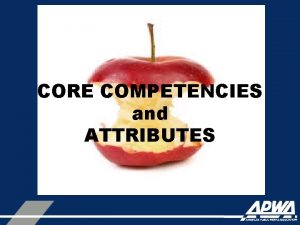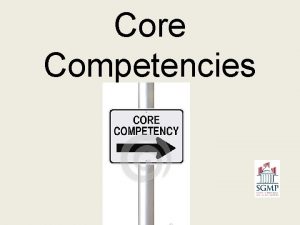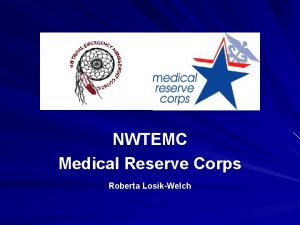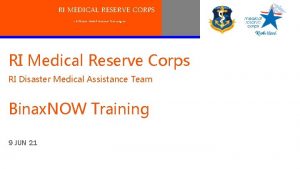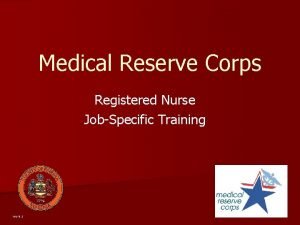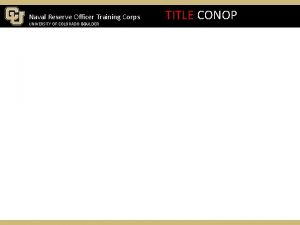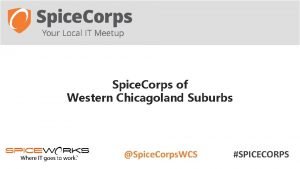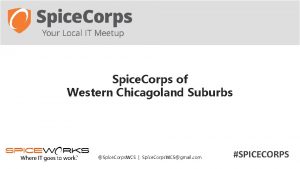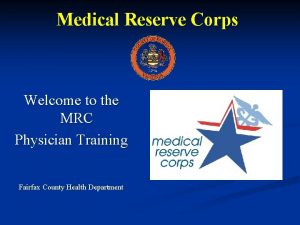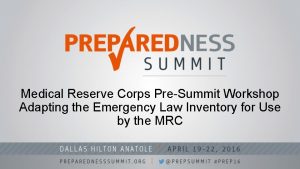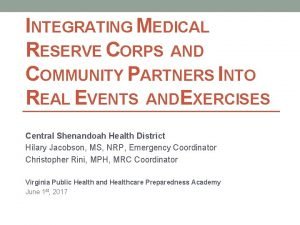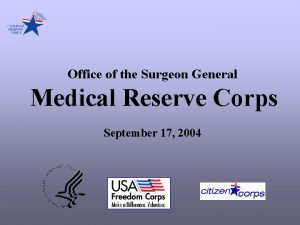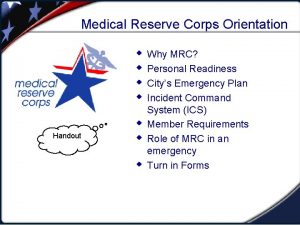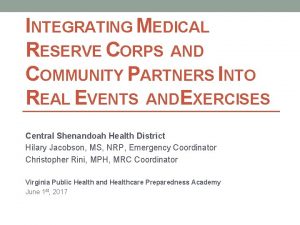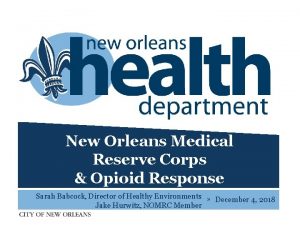MEDICAL RESERVE CORPS CORE COMPETENCIES TRAINING WESTERN MASS


























































- Slides: 58

MEDICAL RESERVE CORPS CORE COMPETENCIES TRAINING WESTERN MASS MRC 101 INTRODUCTION AND ORIENTATION 11/14/2015

WELCOME The MRC Experience …gives you an opportunity to work and train with a group of people, who like yourself, want to be part of the solution when disasters or public health emergencies happen.

WE’RE EVERYWHERE 792 units and 73, 730 volunteers in 2009 997 units and >202, 554 volunteers in 2015

FREEDOM CORPS

VOLUNTEERS Who? • people of all ages, from all walks of life • clinical and non-clinical What? • your role depends on your physical ability, training, expertise and interests How? • all service is voluntary

COMMUNITY PARTNERS • public safety • public health • hospitals • MAResponds. org – our volunteer registration system • volunteer partners (DART, CERT, American Red Cross) • community and faith-based organizations • COAD (Community Organizations Active in Disasters)

ORGANIZATIONAL STRUCTURE Federal MRC (Assistant Secretary for Preparedness and Response) MA MRC Western MA MRC Special Teams County MRC DART Teams MRC Units

WHAT WE DO Mission We build resilient and healthy communities Vision Individuals and communities committed and totally ready to manage all hazards

FUNDING • federal funding in the form of grants • state funding to Western MA regions • some units have 501 c 3 status and can fundraise • most units rely on in-kind support from their host communities 9

CORE VALUES Community: we honor community based volunteerism Action: we support public health volunteerism and service Resourcefulness: we create opportunities to learn and develop relationships and resources Teamwork: we collaborate and work together Diversity: we accept and respect cultural identity

OUR STRENGTHS Volunteers • are pre-identified • have verified credentials • receive training • complete and pass background checks

VOLUNTEER INVOLVEMENT Tier 3 - Leadership Tier 2 - Active Participates in training, exercises & events Tier 1 - Basic Emergency only

MARESPONDS: www. maresponds. org A secure statewide database of pre-credentialed volunteers, managed by the Department of Public Health • volunteers maintain a profile including contact information, credentials and training records • Criminal Offender Record Information Acknowledgement Form • used to contact volunteers about training, unit activities and deployment opportunities via • email • phone • or text message

TRAINING OPPORTUNITIES Based on core competencies Required • MRC 101 • Incident Command (ICS) • Psychological First Aid Optional • CPR/First Aid, emergency dispensing, shelters, pandemic flu, hazardous materials, threats etc. • “Just-in-Time” training • Exercises, workshops and conferences

VOLUNTEER LEARNING PATHS Volunteer Core Competencies are categorized by: • Preparedness • Response • Leadership • Support for Community Resilience Each Leaning path has associated Core Competencies

VOLUNTEER PREPAREDNESS PERSONAL AND FAMILY PREPAREDNESS AND SAFETY C 1 C 5

PRACTICE THE LIFE SAFETY CODE • FIRST …protect yourself • THEN …others • THEN …control the incident • THEN… save property and the environment

C-1 DEMONSTRATE PERSONAL AND FAMILY PREPAREDNESS • have a family preparedness plan • know about • • school plans workplace plans local plans your friends and neighbors’ plans Complete a personal and family preparedness plan

MAKE A 72 -HOUR PLAN You should plan on taking care of yourself and your family for 72 hours. View this training: Resources (click for video) www. wmmrc. org www. ready. gov

C-5 DEMONSTRATE KNOWLEDGE OF PERSONAL SAFETY MEASURES • Learn about and use standard precautions • Ask for training about how to use personal protective equipment (PPE) Demonstrate safe behaviors during MRC activities

PRACTICE HEALTHY HABITS Your best protection is a strong immune system, so… eat well, get plenty of rest and exercise • follow good hand washing and cough etiquette practices • use sanitizer frequently •

VOLUNTEER RESPONSE MRC RESPONSE PLANS, COMMUNICATION, ROLES, AND SERVICE IMPLICATIONS C 2 C 4 C 6 C 7

C-2 DEMONSTRATE KNOWLEDGE OF YOUR EXPECTED ROLE IN RESPONSE PLANS 1. Activation, reporting and demobilization 2. Professional and ethical conduct 3. Incident command system

WE PROVIDE SUPPORT DURING FOUR STAGES OF AN EMERGENCY PREVENT PROTECT RECOVER RESPOND

THE MRC EMERGENCY RESPONSE ROLE The MRC fills a support function: we are not first responders. We: • support public health and public safety responders • follow established protocols and job descriptions • follow the incident command system • work within our training, capabilities and licenses

ACTIVATION METHODS Know your unit’s notification system: • Health and Homeland Alert Network (HHAN) • e-mail from Unit Coordinator • MAResponds email, phone or text • phone tree • social media • update your information regularly with your coordinator and on MAResponds www. maresponds. org • check information at www. wmmrc. org

ACTIVATION, REPORTING AND DEMOBILIZING Only unit coordinators will request volunteers • never self-deploy…this is grounds for dismissal • follow activation instructions • receive your incident assignment: • reporting location and time • expected length of the assignment • Job Action Sheet • communications plan Follow activation, reporting and demobilization procedures

WHAT TO BRING • carry government issued photo ID and your badge • wear your MRC uniform/t-shirt/hat • wear appropriate clothing (wet, cold, heat) • bring basic personal supplies e. g. medications, sunscreen, bug spray, water, snacks, etc. • bring specialized supplies or equipment required

AT YOUR ASSIGNMENT • always sign in and sign out • obtain a briefing • if you don’t understand your job: ASK! • participate in Just-in-Time training • get required forms and work material • ask about security and report concerns • complete required forms

AFTER YOUR ASSIGNMENT • help with the demobilization • return supplies and equipment • return completed forms • sign out on-site • report to your unit coordinator • participate in after action meetings and reports

PERSONAL LIMITATION AWARENESS If you are unsure about your job limits, ask! Work within the scope of your : • professional license • personal ability • training • job description • Incident Command Structure position

PRINCIPLES OF OPERATION Deployment is voluntary and follows these principles: • We treat all with respect • We honor all volunteers • We communicate clearly • We ensure volunteer safety (ourselves and others) • We work within our credentials, training and comfort level

Volunteer Expectations • complete all required training • sign and follow the MRC Confidentiality Agreement • sign and follow the MRC Code of Conduct • complete criminal offender checks • provide current credentials Follow policies and procedures related to professional and ethical representation of the MRC

SERIOUS BREACHES OF CONDUCT Volunteers may be dismissed according to procedures outlined in the policy manual for: • dishonesty • breach of confidentiality • unsafe work habits • violation of the Code of Conduct or other agreements • Inappropriate substance use • unsatisfactory CORI/VSOS check

INCIDENT COMMAND (ICS) PYRAMID Incident Commander MRC Public Information Officer Safety Officer Liaison Officer Operations Planning Logistics Finance/ Administration

UNDERSTAND FOLLOW ICS • • standardized system used by all responders clear management structure with unity of command; i. e. one leader common terminology for positions, procedures and equipment flexible - expands and contracts as needed defined roles and responsibilities span of control of 5 -7 people go to FEMA for online training at training. fema. gov Describe the chain of command during MRC activities

C-4 COMMUNICATE EFFECTIVELY • do not talk to the media unless authorized to do so • • • refer media to your supervisor or the Public Information Officer (PIO) • check for social media guidelines know how to use communication equipment understand communication protocols maintain confidentiality (verbal, written and photos) always be open, direct and tactful Describe communication responsibilities and procedures

COMMUNICATION IN EMERGENCIES Usual methods may not work in stressful situations Communicate: • simple, plain language • slowly, clearly, loudly • repeat the message • use multiple communication channels • ask if they understood the message

C-6 UNDERSTAND THE MRC EMERGENCY RESPONSE ROLE Surge Capacity MRC units assist with a variety of response activities: • emergency dispensing at public and closed sites • emergency shelters • pet shelters • Volunteer Reception Center management • support first responders, e. g. firefighter rehabilitation Describe how the MRC serves the community

MRC NON-EMERGENCY ROLES • provide community education and outreach, • • • including public awareness campaigns for personal preparedness help at annual flu clinics assist those with Access and Functional Needs participate in training and exercises participate in emergency plan development attend MRC, COAD, DART, CERT, HAM radio meetings

BEHAVIORAL HEALTH PRINCIPLES AND PRACTICE UNDERSTAND PRINCIPLES AND PRACTICE FOR CLINICAL MANAGEMENT C 7

C-7 UNDERSTAND THE IMPACT OF AN EMERGENCY ON BEHAVIORAL HEALTH Stress is a normal person’s normal reaction to abnormal situations You come first! Protect yourself… take breaks eat well…exercise beware of your stress level and that of your co-workers do not self-medicate - alcohol and drugs are not the answer to stress • ask for help if you need it • • Identify the behavioral health impact of an event on an MRC volunteer, their family, team and the community.

BEHAVIORAL HEALTH/ FIRST AID • it’s the little things… • “How can I help? ” • don’t presume to know…ASK • acknowledge problems • provide constructive action ideas • be calm, considerate and compassionate • be aware that we all react differently to a crisis • learn about and respect cultural diversity • just listening can be the most important thing

VOLUNTEER LEADERSHIP SITUATIONAL AWARENESS AND PUBLIC HEALTH PRINCIPLES AND PRACTICE FOR MANAGEMENT OF ALL C 3 C 8

C - 3: SITUATIONAL AWARENESS • attend optional MRC training about hazmat, terrorist , biological and environmental emergencies • anticipate deployments by watching the news • monitor social media • watch for alerts from your unit leader • during deployments attend briefings

C - 8: SERVING ALL POPULATIONS In disasters we need to be ready to serve the basic needs of all those represented in the community Cultural Needs • Safety • Medical Care • Language • Food and Religion • Gender differences Access & Functional Needs • Communication • Medical • Independence • Supervisory • Transportation Demonstrate cultural humility and know how the MRC serves the community

SERVING THOSE WITH DISABILITIES AND ACCESS & FUNCTIONAL NEEDS: C-MIST During an emergency many people will have access and functional needs. MRC cares for all. C - Communication: limited or no ability to speak, see, hear or understand M - Medical: chronic , contagious or terminal illness I - Independence: need assistive devices or assistance S - Supervision: children, some elderly and those with mental health issues, addiction etc. . T - Transportation: disability; poverty, legal restrictions

CULTURAL HUMILITY • culture is a predominant force in our lives • everyone has both personal and group identities • diversity within cultures can be vast and significant • each individual and group has unique cultural values and needs Be aware of and open to this diversity

THE PROCESS OF CULTURAL COMPETENCY • be open and seek to understand…ask about culture • during a disaster people often cling to their cultural identity: anticipate and accommodate • consider language barriers, cultural differences in gender roles, the role of children, diet, religion etc. . • take advantage of the opportunity for personal and professional growth Demonstrate cultural humility during MRC activities

VOLUNTEER SUPPORT FOR COMMUNITY RESILIENCY ETHIC AND LEGAL PRINCIPLES AND RECOVERY CONSIDERATION C 9 C 10 C 11

C-9 ETHICAL PRINCIPLES • respect the rights and dignity of all volunteers and clients while representing the MRC • do not disclose confidential information about volunteers or clients • contact the unit leader if you believe any confidential information has been disclosed • use honor, integrity, fidelity, and ethical behavior to guide decisions under challenging circumstances. Follow policies and procedures related to professional and ethical representation of the MRC

C - 10: UNDERSTAND LEGAL PRINCIPLES THAT PROTECT HEALTH AND SAFETY Liability protection is varied and coverage depends on working within: • your job description • your credentials • the situation • community protections Federal Volunteer Protection Act and State Good Samaritan laws apply Demonstrate safe behaviors during MRC activities

C- 11 UNDERSTAND SHORT AND LONG-TERM RECOVERY ISSUES • more traumatic events occur within minority and marginalized groups …with greater risk for negative health/behavioral health outcomes • disaster may re-traumatizes refugee population who have fled war, famine, genocide • children need support through the traumatic stressors and loss • cultural liaisons can assist with understanding these behavioral health issues and trauma Identify the health and behavioral health impacts of disasters

MRC RECOVERY ACTIVITIES • after deployment the MRC may offer critical stress management for volunteers, as needed • the MRC is part of the Community Organizations Active in Disasters (COAD), an organization with a focus on recovery • active recruitment of volunteers with expertise in Access and Functional Needs, children in disasters and mediation/ombuds skills who can assist during and after an emergency • training and educational opportunities

CONTACTS PEOPLE AND WEBSITES

WEBSITE RESOURCES Western MA www. wmmrc. org State www. mamedicalreservecorps. org www. mass. gov/dph www. sites. bu. edu/masslocalinstitute/ www. mass. gov/mema National www. medicalreservecorps. gov www. ready. gov www. pandemicflu. gov www. cdc. gov www. mrc. train. org

CONTACTS: www. wmmrc. org County Coordinators Berkshire Corinne Mc. Keown Franklin Robert Quinn-O’Connor 413 -774 -3167 x 137 Citizen. Corps@frcog. org Hampden Lois Luniewitcz 508 -450 -4226. loisluniewicz@comcast. net 413 -429 -6363 lorendavine@gmail. com Hampshire Loren Davine 413 -528 -0251 cmckeown@wmmrc. org

THANK YOU FOR BEING THE RESPONSE! WESTERN MA MEDICAL RESERVE CORPS 58
 Shelby county medical reserve corps
Shelby county medical reserve corps Ri medical reserve corps
Ri medical reserve corps Fairfax mrc
Fairfax mrc Source of capital reserve
Source of capital reserve Contingency reserve vs management reserve
Contingency reserve vs management reserve Difference between capital reserve and reserve capital
Difference between capital reserve and reserve capital Case western reserve university case school of engineering
Case western reserve university case school of engineering Business analyst skills and competencies
Business analyst skills and competencies Myedhc
Myedhc Resources and competencies analysis
Resources and competencies analysis Nacada core competencies
Nacada core competencies Acgme core competency
Acgme core competency Nurse practitioner core competencies
Nurse practitioner core competencies Ipac online course
Ipac online course Core competencies of a company examples
Core competencies of a company examples Capabilities vs competencies
Capabilities vs competencies Stroke star competencies
Stroke star competencies Strategic analysis tool
Strategic analysis tool Core competency of nike
Core competency of nike Rpms mentoring and coaching form
Rpms mentoring and coaching form Subway core competencies
Subway core competencies Ibm leadership model
Ibm leadership model 4 phases of rpms
4 phases of rpms Netflix core competencies
Netflix core competencies Qsen competencies teamwork and collaboration
Qsen competencies teamwork and collaboration Hr core competencies
Hr core competencies Disney core competencies
Disney core competencies Starbucks core competencies
Starbucks core competencies Core competencies analysis
Core competencies analysis Fbi core competencies
Fbi core competencies Intel core competencies
Intel core competencies Opwdd core competencies
Opwdd core competencies Nadsp core competencies
Nadsp core competencies Ipe core competencies
Ipe core competencies Supply chain core competencies
Supply chain core competencies Marine corps core values
Marine corps core values Ca character
Ca character Navy supply corps officer career path
Navy supply corps officer career path Cacc ribbons
Cacc ribbons Homelessness leadership council
Homelessness leadership council Western regional training center
Western regional training center Inner core and outer core
Inner core and outer core The central part of the earth below the mantle
The central part of the earth below the mantle Which layer is the least dense
Which layer is the least dense Purpose of paradox
Purpose of paradox Collar button lesion
Collar button lesion Core mass
Core mass Mass to mass formula
Mass to mass formula What is atomic number
What is atomic number Relative atomic mass of beryllium
Relative atomic mass of beryllium Percentage composition of propane
Percentage composition of propane Inertial mass vs gravitational mass
Inertial mass vs gravitational mass Molar solution
Molar solution Molecular mass
Molecular mass Molar mass def
Molar mass def Convert from mass to moles
Convert from mass to moles Molar mass units
Molar mass units Mass/mass problems
Mass/mass problems Atomic mass and atomic number difference
Atomic mass and atomic number difference
